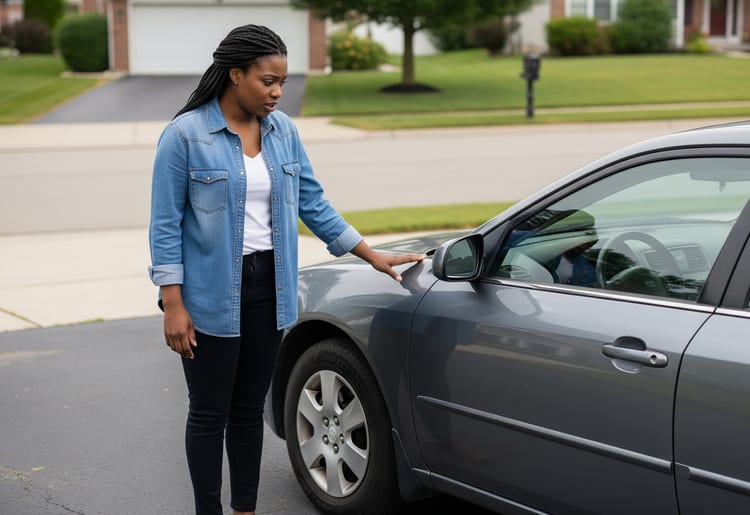- Home/
- Car Insurance /
- What to Do if Your Car Insurance Lapses
What to Do if Your Car Insurance Lapses
A car insurance lapse means you're driving illegally and could face fines up to $5,000, jail time, or license suspension.
September 9, 2025

A car insurance lapse means you're driving illegally and could face fines up to $5,000, jail time, or license suspension.
September 9, 2025

Whatever the reason, finding yourself without car insurance coverage can be stressful. The good news? A lapse doesn't have to become a major crisis if you act quickly.
This article will walk you through exactly what to do if your coverage lapses, how to get back on the road legally, and simple steps to prevent it from happening again.
A car insurance lapse occurs when you don't have coverage for a certain period, typically because you missed a premium payment or your policy didn't renew.
"An auto insurance lapse occurs when you don't have coverage for a certain period, typically because you missed a premium payment or your policy didn't renew," explains Greg Martin, president at Think Safe Insurance.
A lapse can also happen if you switched insurers and there was a gap between when your old coverage expired and your new policy began.
How long you can go without coverage before it's considered lapsed depends on your state and insurance company. Some states and insurers offer grace periods—the time you have to pay for your policy before it officially lapses.
Grace periods vary significantly, ranging from one to 60 days or more. Georgia gives drivers 30 days to secure coverage, while Wyoming offers only a 7-day grace period, and North Carolina provides 10 days.
A car insurance lapse can lead to serious consequences since driving uninsured is illegal in almost every state. The penalties vary by state and whether it's your first offense, but you'll likely face fines between $50 to $5,000.
Additional penalties could include:
If you're in an accident without insurance, you'll pay all expenses out-of-pocket. Depending on the accident's severity, this could mean thousands of dollars in damages, medical bills, and legal costs—potentially devastating your finances.
If your car insurance has lapsed, it’s your responsibility to lock in coverage as soon as possible. Here's what you need to do:
“If your insurance policy has been canceled due to non-payment, you might be able to reinstate it and avoid a lapse in coverage, depending on your company policies,” explains Martin. Typically, you’ll have to cover any missed payments plus a reinstatement fee.
Understand that if your coverage has lapsed for more than a few days, things can be a bit complicated. Some insurers may allow you to reinstate your policy after an extended lapse, while others may require you to start from scratch with a new policy instead.
“If you can't get your policy reinstated, then apply for new coverage right away,” advises Martin. You can shop around and compare plans from different insurance companies. Ideally, you’d get quotes from at least three insurers.
As you explore your options, compare rates, coverage levels, customer service reviews, and financial strength ratings to find the ideal plan. You’ll find that some car insurance companies will penalize you with higher rates than others, so doing your research is key. Consider temporary car insurance or even pay-per-mile insurance if you're looking for short-term coverage.
The best way to handle a lapse is to prevent it from happening. Here's how to keep your coverage active:
A car insurance lapse can be costly and stressful, but quick action minimizes the damage. Contact your insurer immediately to reinstate coverage, or shop for a new policy if reinstatement isn't possible. Most importantly, set up automatic payments and stay vigilant to renewal notices to prevent future lapses.
1. What does it mean to let your insurance lapse?
When your car insurance lapses, you're no longer insured by your insurance company. This may be because you didn't pay your premium, your insurer cancelled your policy, or you simply didn't renew your coverage.
2. What happens if car insurance lapses?
In most states, an auto insurance lapse means you're driving illegally. If your policy lapses, you may face serious consequences, such as fines, jail time, and a driver's license suspension. Plus, you might have to pay hefty out-of-pocket costs if you get into an accident and don't have insurance.
3. What do I do if my car insurance lapses?
As soon as you find out your auto insurance has lapsed, reach out to your car insurance company to reinstate coverage. If this isn't an option, you'll need to secure a plan with a new car insurer.
Anna Baluch is an insurance and finance expert at BestMoney.com. She has written for Forbes, Newsweek, Credit Karma, CNN, and many other top publications.